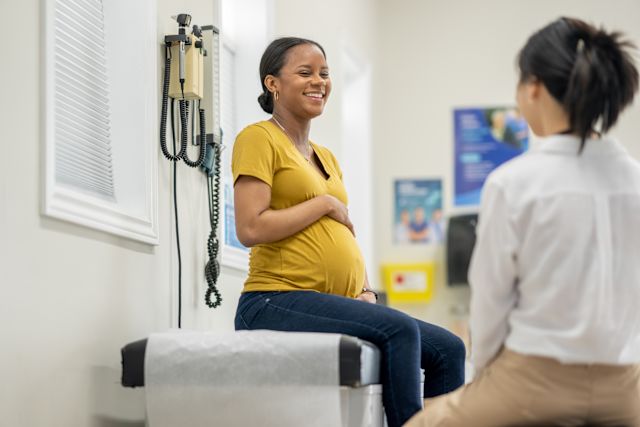Updated on October 17, 2024.
If you’re pregnant, have recently been pregnant, or plan to become pregnant in the future, you need to be vaccinated against COVID-19. The Centers for Disease Control and Prevention (CDC) strongly recommends vaccination for pregnant people, people who have recently been pregnant and/or currently breastfeeding, those trying to get pregnant, and those who might become pregnant in the future.
Why vaccination is important
If you’re pregnant or were recently pregnant, you are more likely to get severely ill from a COVID infection. You’re also more likely to have complications from the illness that can harm your baby and may even cause stillbirth or premature birth.
Getting a COVID vaccination while you’re pregnant will safely lower your risk of serious illness and complications. The CDC states that vaccination is the single best protection against hospitalization or death from COVID. Other leading medical organizations agree.
The American College of Obstetricians and Gynecologists (ACOG), the American Society for Reproductive Medicine, and the Society for Maternal-Fetal Medicine say that COVID vaccination is both effective and safe during pregnancy.
Vaccines are safe and beneficial
If you’re pregnant or breastfeeding, it’s understandable if you’re concerned about the possible risks that a COVID vaccine could pose to your baby. But large-scale studies from around the world have demonstrated that COVID vaccines are not only safe but also helpful to both the baby and the parent. The evidence is clear that vaccination can prevent illness and even save the lives of pregnant people and their children.
Being vaccinated reduced the risk of getting COVID by 60 percent in a 2023 systematic review and meta-analysis published in Reviews in Medical Virology. And if a pregnant person did get COVID, being vaccinated offered these benefits compared to being unvaccinated:
- It lowered their risk of being hospitalized by 53 percent.
- It lowered the risk of stillbirth by 45 percent.
- It lowered the risk of premature birth by 15 to 33 percent.
The harms of not being vaccinated are also clear. A COVID infection can become quite serious for an unvaccinated pregnant person, raising the risk of death for both parent and baby, along with other health issues. And even if an unvaccinated pregnant person gets a mild case of COVID with few or no symptoms, their babies’ immune systems will likely still be weakened by their parent’s infection, leaving them more vulnerable to a range of illnesses, according to a 2023 study published in JCI Insight.
Here are more facts about the safety and efficacy of getting the COVID vaccine while pregnant or breastfeeding:
Vaccines do not increase the risk of health issues
Vaccination does not raise the risk of any of a long list of health issues, such as miscarriage, gestational diabetes, Cesarean delivery, low or very low birthweight, or fetal abnormalities, according to a large 2023 systematic review and meta-analysis published in Reviews in Medical Virology, which looked at 30 studies and nearly 900,000 pregnancies.
Vaccines boost immune response
Vaccines offer a robust immune response in pregnancy—and that immunity can be transferred to unborn babies. The vaccines generate strong antibodies to fight COVID infection, which is important because babies need to wait until they are six months old to receive a COVID vaccination.
Vaccines do not cause COVID
Vaccines cannot cause COVID, since they don’t contain a live virus. They cannot make a pregnant person or their baby become sick with COVID.
Side effects are mild and temporary
The mild side effects the vaccine can cause are no different for pregnant people than for people who aren’t pregnant, says the CDC. These side effects include swelling, redness, or pain on the arm that received the shot, as well as fatigue, headache, chills, nausea, and fever. These side effects generally go away after a few days and many people experience no side effects at all.
Vaccination is safe and effective while breastfeeding
Research shows that vaccinated people who are breastfeeding actually have antibodies in their breast milk that offers protection to their infants.
Stay up-to-date with your COVID vaccines
The CDC recommends that everyone older than six months old should get the most recent updated COVID vaccines from either Pfizer-BioNTech, Moderna, or Novavax. You or your child might need one or more doses, depending on your or your child’s age, health profile, and previous vaccine experience.
Don’t forget your other vaccines
With a lot of talk in recent years centered around COVID vaccines, it’s important not to overlook vaccines that protect against other infections while you’re pregnant. The CDC recommends that all pregnant people get the following vaccines:
- Influenza (flu)
- Tdap, which protects against tetanus, diphtheria, and pertussis (also known as whooping cough)
- Respiratory syncytial virus (RSV)
All these vaccines are safe for pregnant people and their babies. Talk to your healthcare provider about the vaccine schedule that is appropriate for you.







